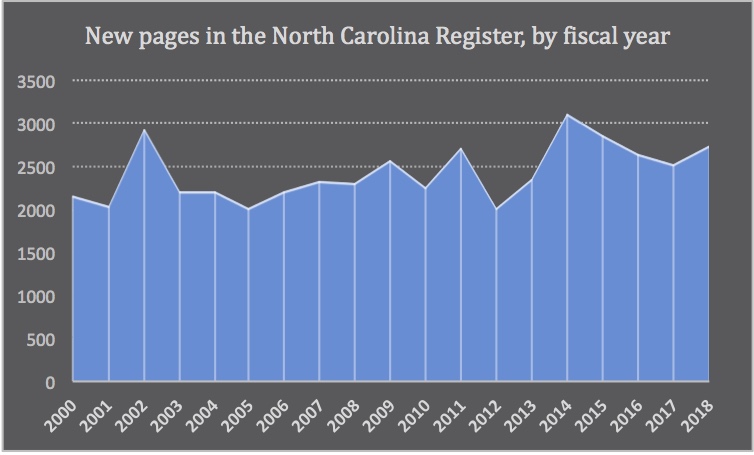One thing about the administrative state in North Carolina is that it carries on regardless of the party in power.
Here’s a graph of the annual page counts in the North Carolina Register from Fiscal Years 2000 to 2019. This is a handy indicator of regulatory activity we have used for many years:

(Click the image for a larger size.)
This constant hum of regulatory activity is why sunset with periodic review is so important. As a regular clean-up of the state’s regulatory toolshed, periodic review has already been removing about one out of every 10 state rules examined.
But with regulation being fraught with red tape and overregulation, both of which are harmful to job creation and the state’s overall economic health, periodic review is not enough. That’s why we favor a menu of reforms and good-government policies to ensure that the state’s regulatory environment is light, lean, up-to-date, and sensible. They include:
- A “rules throttle” approach to ensure legislative scrutiny of any rules that would impose a significant cost on the state’s private sector, whether directly or indirectly.
- Reforming the state’s approach to occupational regulation, including Occupational Licensing Consumer Choice and a Right to Earn a Living Act.
- Small-business regulatory flexibility to let agencies make common-sense adjustments to small businesses’ regulatory burdens, such as compliance and reporting requirements.
- A default mens rea statute for when state code is silent over the penalty for breaking a rule, which would restore the crucial, common-law protection against leveling criminal penalties against someone for breaking a rule or law unknowingly and without meaning to.
- Regulatory budgeting (also called regulatory reciprocity) to help keep regulatory burdens light and only when needed.
- Stated objectives and outcome measures to make sure rules work as intended.
- Implementing strong cost/benefit analysis of rules.
- Expanding the no-more-stringent laws already placed on state environmental agencies to apply to all state agencies.


